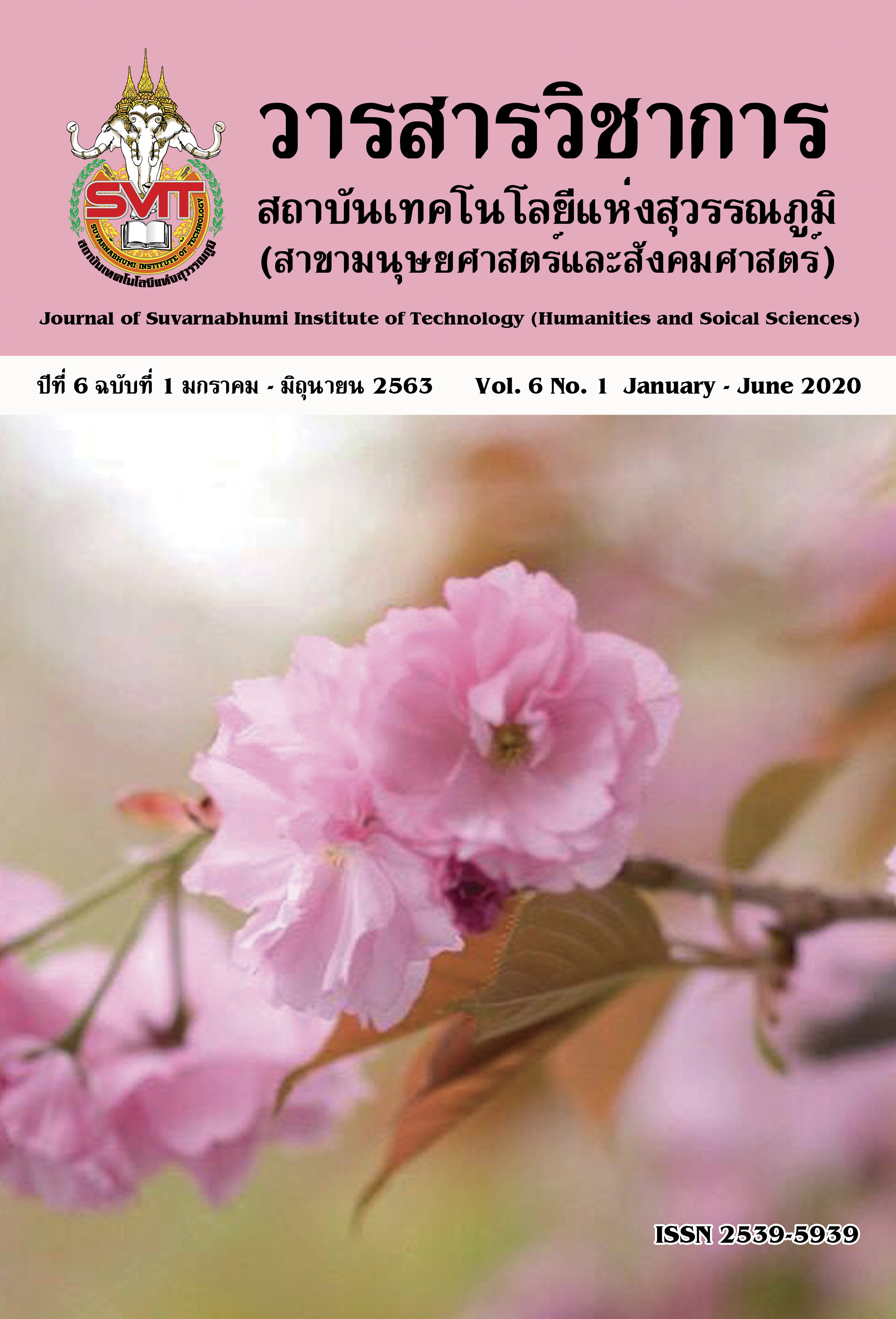THE DEVELOPMENT MODEL FOR KNOWLEDGE MANAGEMENT IN ROYAL THAI NAVY
Keywords:
knowledge management, development model for knowledge management, Royal Thai NavyAbstract
The purpose of this research was to 1) study the state and organizational context of the knowledge management in the Royal Thai Navy. 2) study the knowledge management processes for the Royal Thai Navy and 3) study the development model for the knowledge management for the Royal Thai Navy. This research is a qualitative research. The sample were 51 persons from 36 Upright Departments to Royal Thai Navy The research collected data from semi structured in-depth interview protocol from key informants by using purposive sampling.
The result showed that:
(1) The Corporate context currently, the Royal Thai Navy organizes it government agencies under the Royal Decree 2009, section 11 and the Code of Government for Public Sector Excellence (PMQA) that the focus on the ongoing organization development process. Knowledge management is the key to developing a learning organization and delivering result that meet the organization’s goals. The Royal Thai Navy has set up a commission for the study and knowledge management project. (2) The knowledge management process in the Royal Thai Navy. It was found that the knowledge of the Navy had a 7-steps knowledge management process which was in line with the office of Public Sector Development Commission. (3) The development model of knowledge management. It was found that knowledge management Toolkit. The Navy uses knowledge too based on the criteria of Asian Productivity Organizations and related concepts comprises of 10 KM tools, divided into five types non-IT, five types of IT tools and three Types of KM. tools used in KM activities in the Royal Thai Navy. The tools used in KM activities in Navy is too minimal to match the size of the large fleet of 36 units of Royal Thai Navy under it role and mission of serving the government policy and “Thailand 4.0” driving policy. It is therefore desirable to use new communication platforms used to manage knowledge. The major obstacle in the implementation is the problem of attitude and leadership, values, organization culture that attach to the old bureaucracy. The lack of tools for knowledge management.
References
กองบัญชาการ กองทัพเรือ. (2557). แผนแม่บทการจัดการความรู้ของกองทัพเรือ พ.ศ.2557-2560.
กัญญามน อินหว่าง และคณะ. (2560). รูปแบบการพัฒนาภาวะผู้นำทางวิชาการด้วยการจัดการ ความรู้ของผู้บริหาร ในมหาวิทยาลัยเอกชน. รายงานการวิจัย คณะบริหารธุรกิจ มหาวิทยาลัย เวสเทิร์น, มหาวิทยาลัยเอเชียอาคเนย์, คณะศิลปศาสตร์และวิทยาศาสตร์ มหาวิทยาลัยเอเชียอาคเนย์.
ชมภูนุช สุนทรนนท์. (2559). การสื่อสารเพื่อการจัดการความรู้ขององค์การธุรกิจชั้นนำในประเทศ ไทย. รายงานการวิจัย มหาวิทยาลัยเกษมบัณฑิต.
นริส ประทุมสุวรรณ, พลเรือเอก, ผู้บัญชาการทหารเรือ. (2561). นโยบายผู้บัญชาการทหารเรือ ประจำปีงบประมาณ 2561, กองบัญชาการ กองทัพเรือ กรุงเทพมหานคร.
นพดล พันธุ์พานิช และคณะ. (2555). ความสัมพันธ์เชิงปริมาณระหว่างการปฏิบัติตามกลยุทธ์โดยใช้ 7 เอส ของแมคคินซี่ย์กับความยั่งยืนของความได้เปรียบในการแข่งขันของกลุ่มวิสาหกิจขนาดกลางขนาดย่อมในอุตสาหกรรมเทคโนโลยีชีวภาพของประเทศไทย.วารสารวิชาการสมาคมสถาบันอุดมศึกษาเอกชนแห่งประเทศไทย (สสอท.) ปีที่ 18 ฉบับที่ 2 เดือนธันวาคม 2555.
บุญดี บุญญากิจ. (2561). องค์กรแห่งการเรียนรู้ควรปฏิบัติอย่างไรท่ามกลางการเติบโตของเทคโนโลยีดิจิตัล. TRIS Academy Club, Issue.4, สืบค้นเมื่อ มกราคม 2561.จาก http://www. trisacademy.com/files/3815/1563/4315/TAC_Issue4_Jan2018_Compress.pdf
พรทิพย์ อัยยิมาพันธ์. (2561). “การสร้างผู้นำการเปลี่ยนแปลง สำหรับยุคดิจิตัล เพื่อขับเคลื่อน นโยบาย Thailand 4.0” โครงการฝึกอบรม โดยบริษัท แพคริม ลีดเดอร์ชิป เซ็นเตอร์ จำกัด. พระราชกฤษฎีกาว่าด้วยแบ่งส่วนราชการและกำหนดหน้าที่ของส่วนราชการกองทัพเรือ กองบัญชาการทหารสูงสุด กระทรวงกลาโหม พ.ศ. 2538 และเพิ่มเติม (ฉบับที่ 2) พ.ศ. 2540 และ พ.ศ. 2552
พระราชกฤษฎีการว่าด้วยหลักเกณฑ์และวิธีการบริหารจัดการบ้านเมืองที่ดี พ.ศ. 2546. (2546,9 ตุลาคม). ราชกิจจานุเบกษา. หน้า 1-16.
วิจารณ์ พานิช. (2556). การจัดการความรู้ในยุคสังคมและเศรษฐกิจบนฐานความรู้. กรุงเทพมหานคร:สถาบันส่งเสริมการจัดการความรู้เพื่อสังคม.
สราวุฒิ พันธุชงค์. (2556). เอกสารประกอบการอบรมการจัดการความรู้ MRTA. กรุงเทพมหานคร : ฝ่ายพัฒนาทรัพยากรมนุษย์.
สุทธิรัตน์ พิมพ์พงศ์ และคณะ. (2556). การจัดการความรู้ในคณะพยาบาลศาสตร์ กาญจนบุรี มหาวิทยาลัยเวสเทิร์น คณะพยาบาลศาสตร์, กาญจนบุรี : มหาวิทยาลัยเวสเทิร์น.
สำนักงานคณะกรรมการพัฒนาระบบราชการ (ก.พ.ร.) (2555). หนังสือชุดคู่มือการพัฒนาองค์การ (Organization Improvement Toolkits) ตามแนวทางการพัฒนาคุณภาพการบริหารจัดการภาครัฐ, พฤศจิกายน.
สำนักงานคณะกรรมการพัฒนาระบบราชการ (ก.พ.ร.) (2557). การจัดการความรู้. จากhttp://www.oic.go.th/km/oickm.htm.
สถาบันเพิ่มผลผลิตแห่งชาติ. (2548). การจัดการความรู้จากทฤษฎีสู่การปฏิบัติ. กรุงเทพมหานคร : สำนักพิมพ์ บ.ซีเอ็ดยูเคชั่น จำกัด.
Awad, E.M. ; & Ghaziri, H.M. (2011). Knowledge Management. 2nd Edition. (Eastern economy edition) PHI Learning Private Limited.
Denzin, N.K. (1978). The research act : A theoretical introduction to sociological methods. New York : McGraw-Hill.
Marquardt, M. (2002).Building the Learning Organization : A System Approach to Quantum improvement and Global Success. New York : McGraw-Hill.
Ronald Young. (2010). Knowledge Management Tools and Techniques Manual., served as the volume editor. Tokyo : the Asian Productivity Organization.
Senge, P. M. (1990). The fifth disciplines: the art and practice of learning organization. London: Century Business.
Strauss, A.L., & Corbin, J.M. (1998). Basic of Qualitative Research : Techniques and Procedure for Developing Grounded Theory. 2nd ed. California : SAGE.
Turban, et al., (2001). Introduction to Information Technology, Toronto: John Wiley & Sons.
Downloads
Published
Issue
Section
License
Copyright (c) 2020 Suvarnabhumi Institute of Technology

This work is licensed under a Creative Commons Attribution-NonCommercial-NoDerivatives 4.0 International License.
The articles published are copyrighted by the Sarasas Journal of Humanities and Social Science. The opinions expressed in each article in this academic journal are those of the individual authors and do not reflect the views of Sarasas Suvarnabhumi Institute of Technology. The authors are solely responsible for all aspects of their respective articles. Any errors or inaccuracies in the articles are the sole responsibility of the authors.



